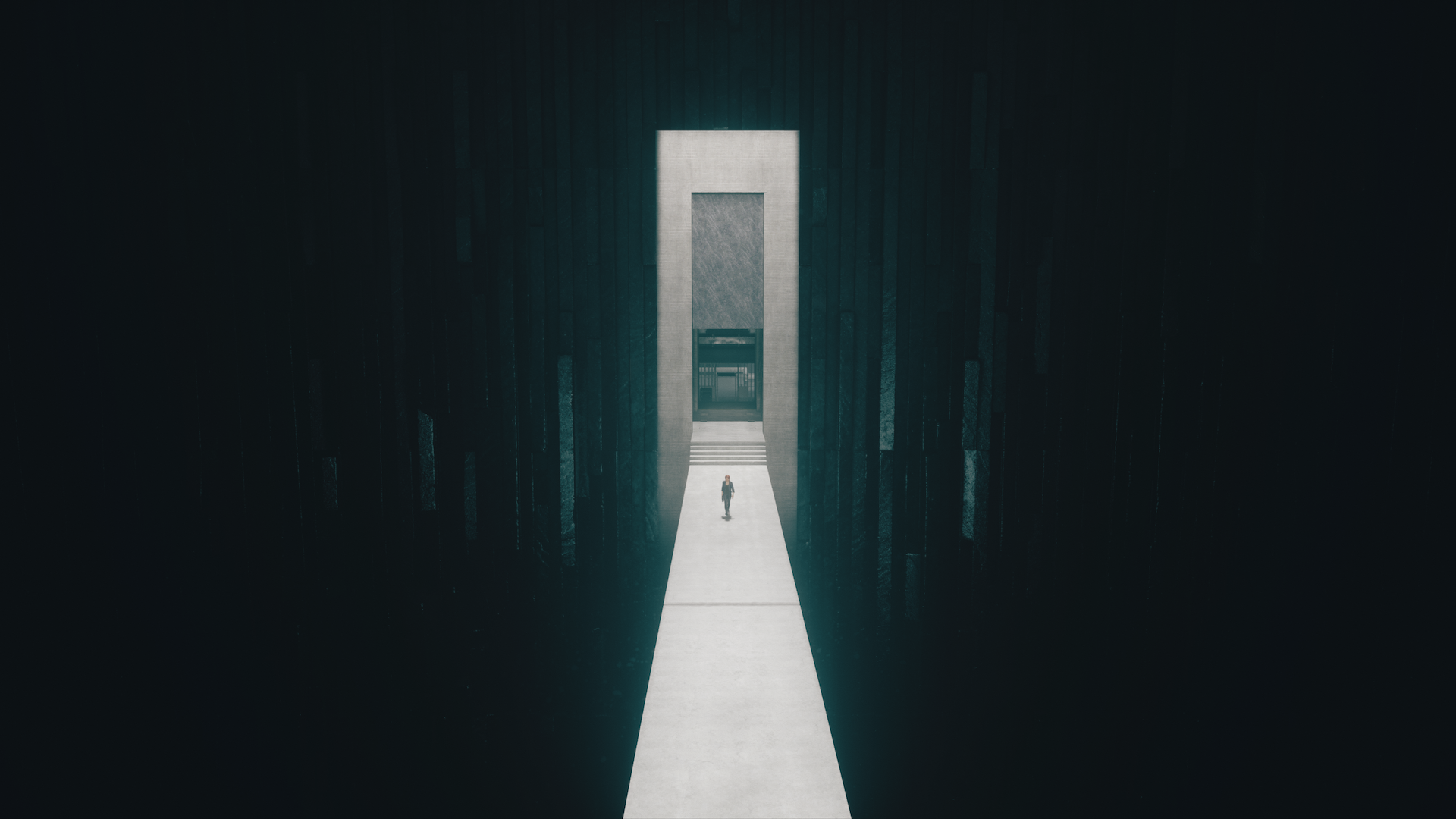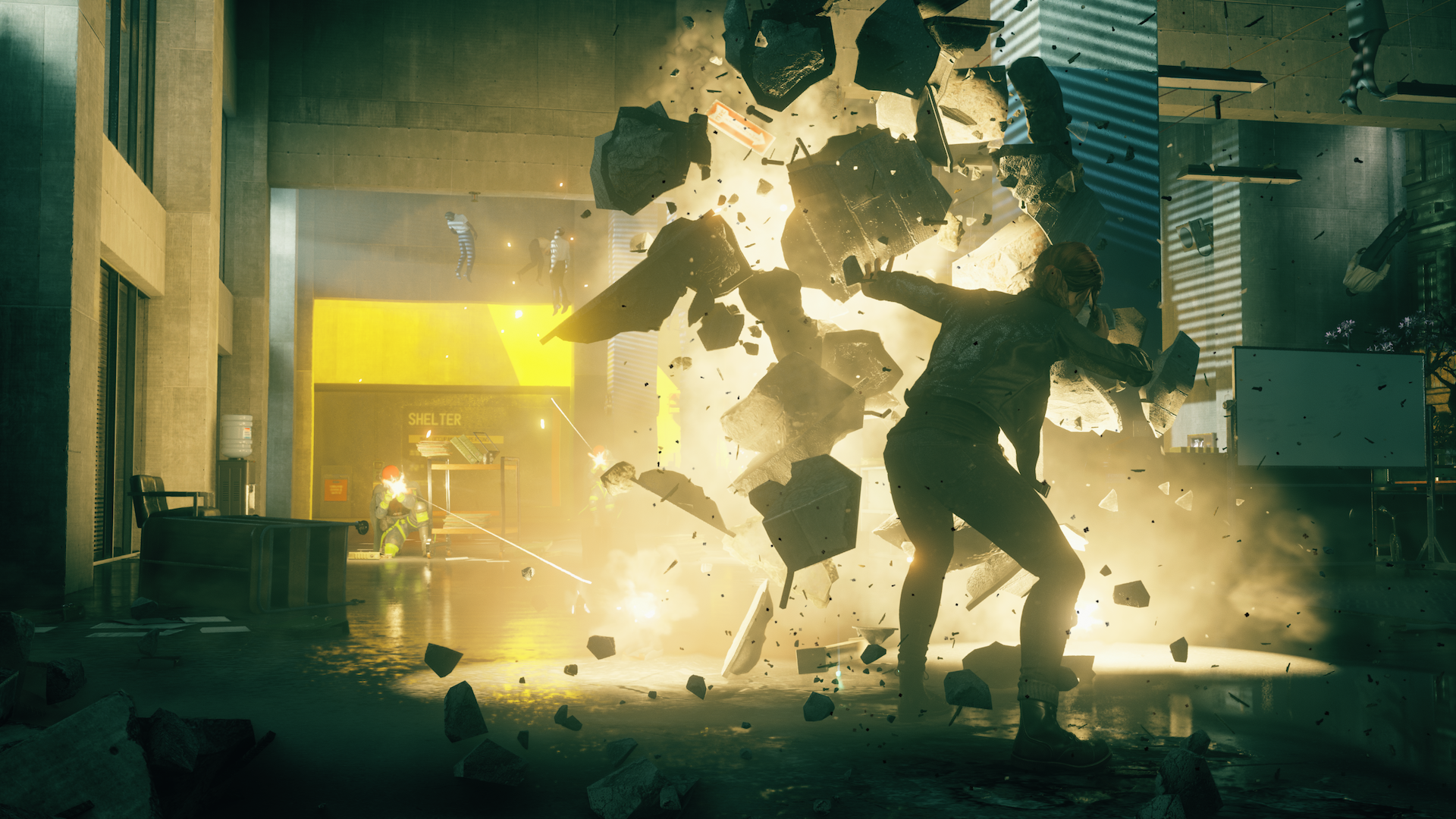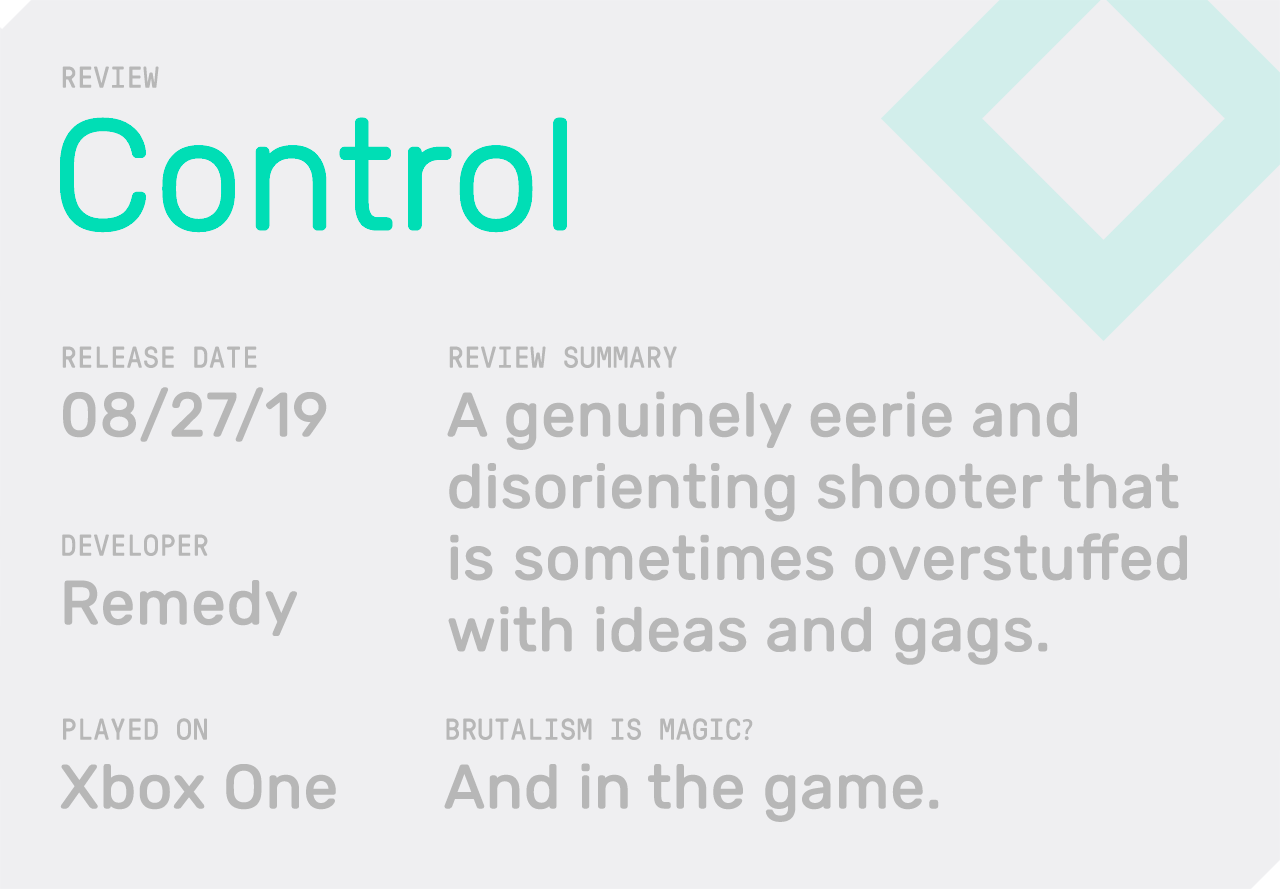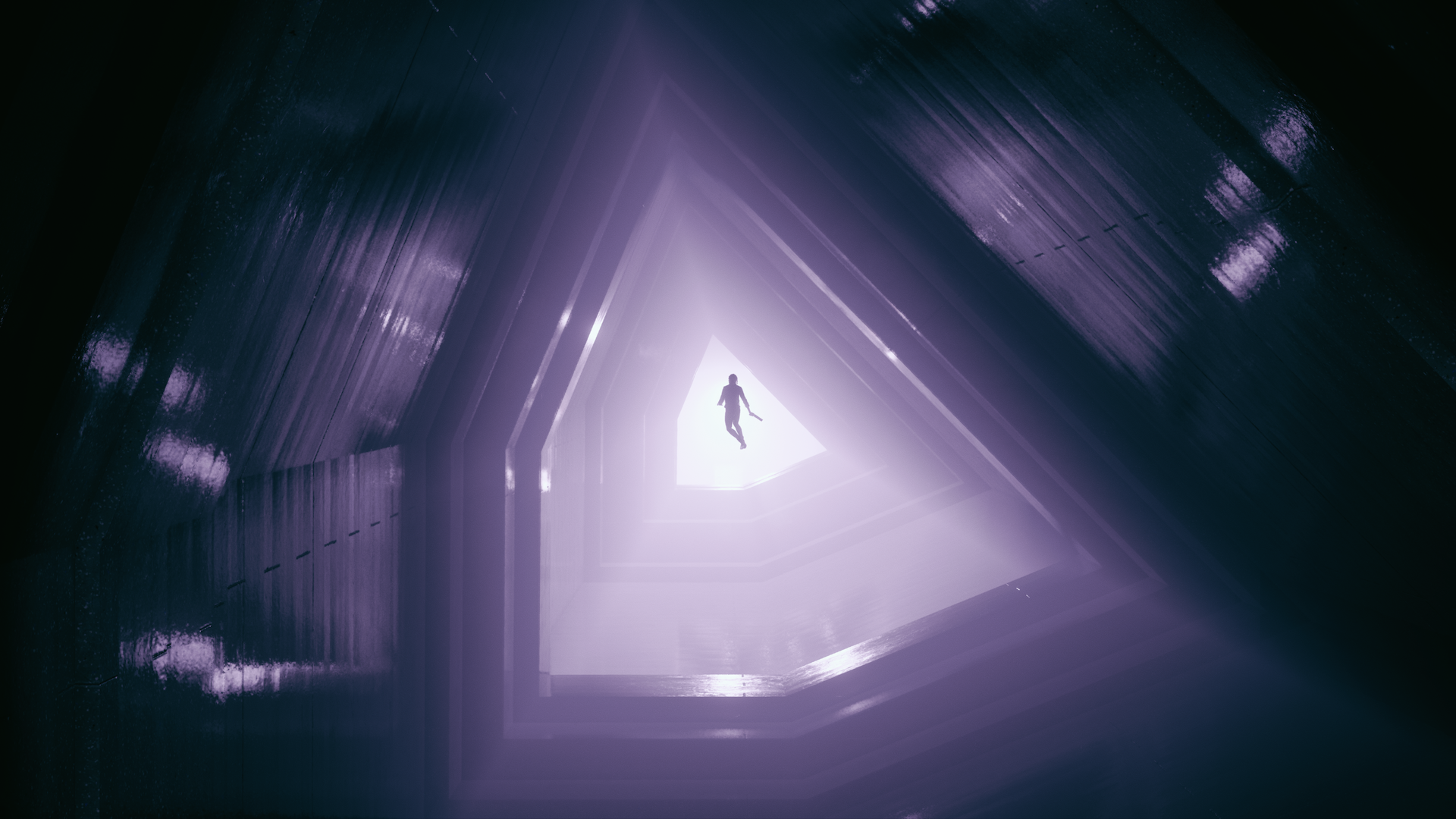Control is less a horror game than it is a game of unsettling strangeness. Horror in its world has become familiar and mundane, something to be managed and quantified and filed away in official reports, but still dangerous even if familiarity has bred contempt. That also makes it a bureaucratic comedy, with midcentury modern aesthetics paying homage to the likes of Dr. Strangelove or Noah Hawley’s surreal Legion. It’s a world of complacent and foolhardy managers who fight budgetary and turf wars with more ferocity than they battle the monsters that they are supposed to contain, while a handful of working stiffs try to keep the dam from breaking. It’s also a super-powered shooter where your character essentially arrives in this world of overmatched middle-managers with the power and force of a demigod and the can-do spirit of someone who is just grateful they finally have a decent job.
It’s every bit as weird a mix as it sounds, and Control is utterly fearless in its willingness to leave players completely baffled about what the hell is going on, or what it is even about. Its various trailers and previews have revealed far more about the game than the game itself seems to wish you to know: It opens on a young woman named Jesse Faden arriving at the New York headquarters of the Federal Bureau of Control. She’s searching for her long-lost brother Dylan, but beyond that we have no idea why she is there, or what this agency is that she thinks might know something about Dylan. You’re just there, in the empty lobby of an apparently empty brutalist office building.
It turns out that Jesse has stumbled into The Oldest House, which is both headquarters to the Bureau of Control and a supernatural hellmouth that the bureau attempts to prevent from corrupting reality. It is, as one character puts it, the place where the apparitions and dreads of popular culture’s collective unconscious have been brought into being and imbued with arcane powers. (Which I guess is why I ended up fighting a boss battle against an antique icebox.)

Jesse has arrived just as a supernatural force has taken over the building and turned most of the people in it into its puppets, yet somehow she is not only immune to this force, but appears to be the only person capable of defeating it… by blasting the shit out of it with a magical semi-automatic pistol, shotgun, SMG, and grenade launcher.
This is extremely “video game logic” but then Control is a game that revels in how strange video games can be, how much they be made to feel like they operate according to dream logic. In over 12 hours with the game through its main quest and major sidequests, I still feel uneasy exploring The Oldest House. While it’s undeniable that the game’s acres of anonymous offices and concrete atriums are justifying a tremendous amount of re-used furniture models and textures, I still find myself walking through now-familiar rooms and hallways and seeing new doors to spaces I haven’t yet explored. The entire game feels slightly unsettled, like it might be changing on you when you’re not looking.
In the game’s lore, that’s exactly what The Oldest House does: It undergoes Shifts that cause entire departments and offices to translocate to somewhere else within the building. I’m still not sure if the game isn’t doing that as well, because while some areas unlock after certain plot developments, I keep encountering others that I could swear weren’t there before.

Wide open, multi-level common spaces, and slab-sided partitions and planters also make for conventional battlegrounds in a shooter, but Remedy is practiced enough at this kind of game that combat feels as good as it does preposterous. You’re battling hackneyed enemy archetypes using likewise-archetypal weapons, but damn if these rooms don’t fly apart into clouds of destroyed furniture, gunsmoke, and atomized concrete. At times I was reminded of Monolith’s FEAR, another proud entry in the “what if you just emptied a clip into it” genre of supernatural horror, as combat reduced yet another office space to devastated rubble.
However, Control gets more interesting as it gives Jesse more supernatural powers herself. They’re hardly revolutionary: By the end of the game she could use telekinesis to fling objects and even slam enemies into one another, warp-dodge away from incoming fire, and levitate a bit like Magneto. But all these powers feel really good, and levitation especially feels a bit god-like as you make impossible jumps, land like a feather at the end of what should be fatal falls, and strike enemies from above. Where Destiny incessantly tells you how special your character is, but only offers you (and all your friends) brief tastes of these kinds of powers, Control gives you increasingly unlimited access to superpowers and makes your character as magical and miraculous as anything she’s tasked with fighting.
On the other hand, much of this is encumbered by a grindy progression system and way, way too much inventory management for marginal gains. It’s not that they don’t matter: I had a few really tricky battles that I effectively solved via a custom item build that allowed me to maximize the effect of key weapons and weather the most damaging counterattacks. The problem is that they require way too much management for what they add to Control. For a game that is basically “Psychic Wizard machine-guns demon army to death,” I spent a lot of time dismantling equipment for parts just to keep from going over inventory limits.

Likewise, too often Control pads out its length with scavenger-hunt quests through previously explored areas of the Oldest House, and conventional “aim for the weak point” boss battles. The toughest fight of its final act is a multi-stage arena fight that ultimately traps you on a small floating platform with a ton of enemies doing area-of-effect damage. Dying there requires repeating every other stage of the battle, a process which takes about ten minutes each time. At the moments where Control gives its biggest narrative payouts, a tedious boss encounter or arena battle often sucks the air out of the room.
That narrative is relayed in some familiar and weird ways, and this is probably where Control is most about your willingness to roll with its goofy punches. Ultimately, this is a game about cloistered bureaucrats who have an important but obscure job. You find the usual mix of funny memos and audio logs describing the tediously horrific daily life of the Bureau of Control. But you also find live-action footage of head scientist Casper Darling giving chipper little internal lectures about the discoveries and dangers the FBC has uncovered. They’re corny and cheap, but actor Matthew Porretta’s performance of Darling slowly becoming more sardonically fatalist is one of the game’s best character arcs. There’s also an inexplicable puppet show that you find episodes of that appears to be telling the story of Jesse and her lost brother Dylan.
You also can review messages from the Board of Directors which guides your actions, and who may be a trans-dimensional hivemind. These are just ominously scored and animated shots of a black pyramid with nonsensical speech playing in the background. Remedy regular James McCaffrey (Max Payne himself) returns as the voice of Director Zachariah Trench, who solemnly unpacks the tragic backstory of the Bureau’s final days across long narrations against a backdrop of looping footage of a backlit man adjusting his glasses and lighting a cigarette.

These are undeniably low-budget, campy ways to tell a story that Control is mostly unable to stage within its own gameplay sequences. Likewise, Courtney Hope (who costarred in Remedy’s Quantum Break) does a terrific job as a practical survivor who finds herself thrust into the midst of a supernatural warzone, but almost all of her reaction shots are close-ups on her character’s nervous, searching eyes while Hope narrates what her character is thinking and feeling, the game’s character models and facial animation possibly unable to do the work themselves. At every turn, Control is using the most contrived and obvious devices to drop loads of backstory and plot of development into a static gameworld that most closely resembles a single-player MMO. It’s like if The Secret World told its story through Adult Swim-inspired shorts.
That might sound like a dubious proposition, which brings us to the crux of this review. More than most games, Control requires an enthusiastic collaborator, not just a player. If you decide you want to enjoy it, you almost certainly will. If you approach it with wary skepticism, Control is unlikely to dispel that. The minute you decide to stop playing along, Control can come apart at the seams. But you can also hold it together with the same enthusiastic curiosity with which it appears to have been made.

I’ll admit I was predisposed to play along because I’ve been going on this ride with developer Remedy and writer Sam Lake since the original Max Payne. Remedy’s games have almost always been a strange mix of genuine craft and self-referential weirdness that verges on self-sabotage. After their two Max Payne games largely played it straight as tributes to 80s and 90’s cop-on-the-edge movies and John Woo gun-ballets, they released the Twin Peaks and Stephen King tribute-band of a video game, Alan Wake. At first playing like a straightforward horror game, Alan Wake slowly turned into an allegory of misbegotten game development. It marks the moment when people either chose to become Remedy fans, or mourned the end of the studio’s involvement with Max Payne. I love Alan Wake and so, with some reservations, I have decided to love Control.
It betrays a lot of stylistic tics and obsessions that sometimes make me worry that Remedy are too quick to settle for the winking metatextual flourish instead of sticking the landing on a story beat. But Control still makes them work because at this point, Remedy has a recognizable house style that it unapologetically owns in every one of its games. Control is instantly memorable, and its best moments will stick in the imagination long after its flaws, commonplace in the scheme of things, have been forgotten like so many of commoditized shooters that Remedy still refuses to make.
from VICE https://ift.tt/2ZmO9Pi
via cheap web hosting
No comments:
Post a Comment